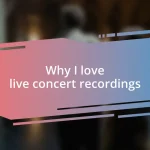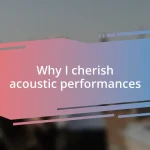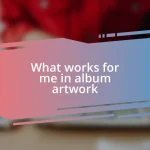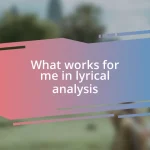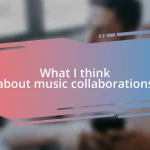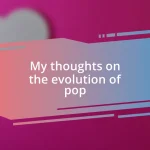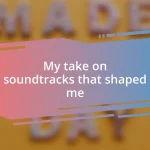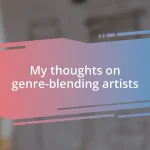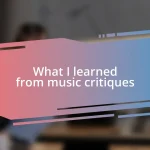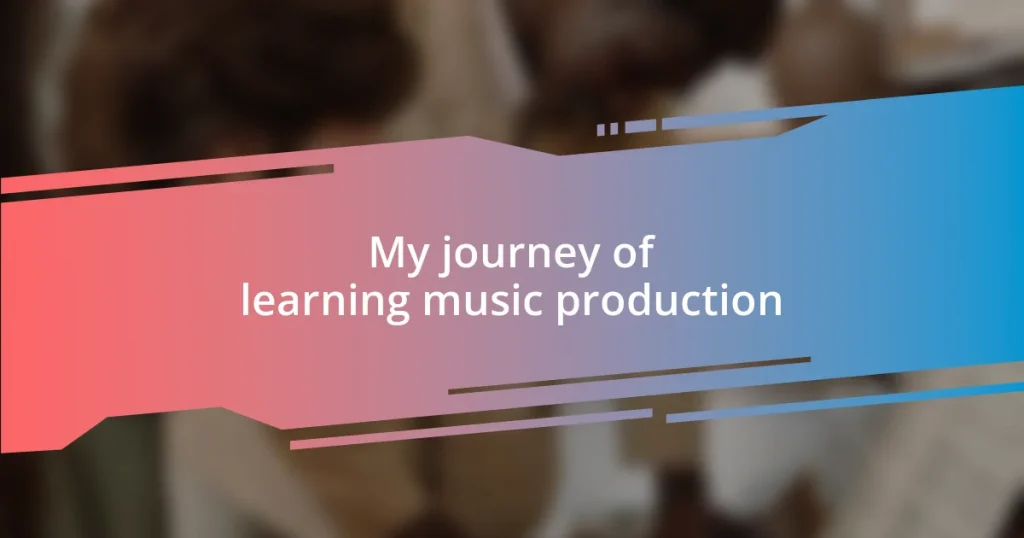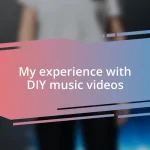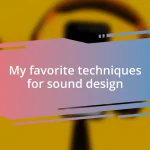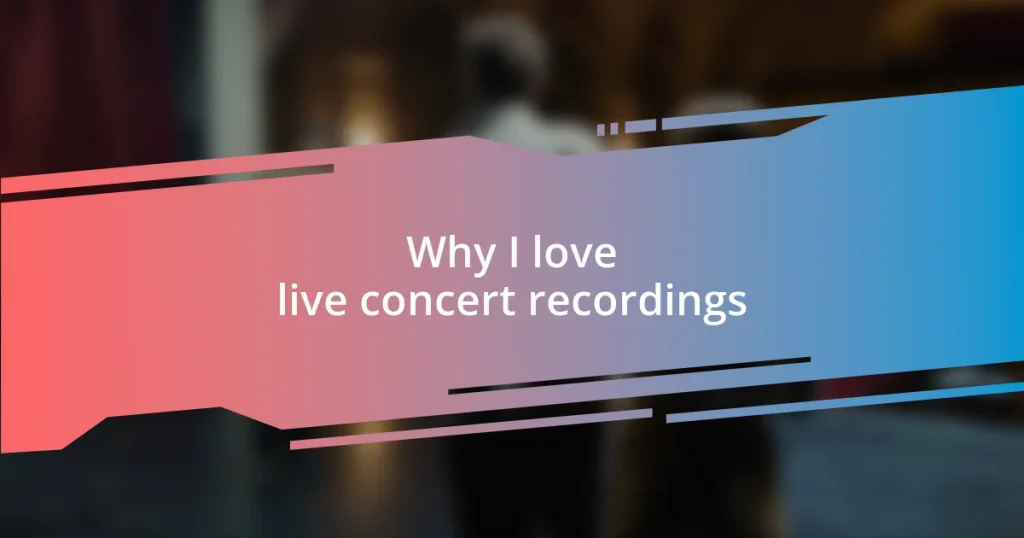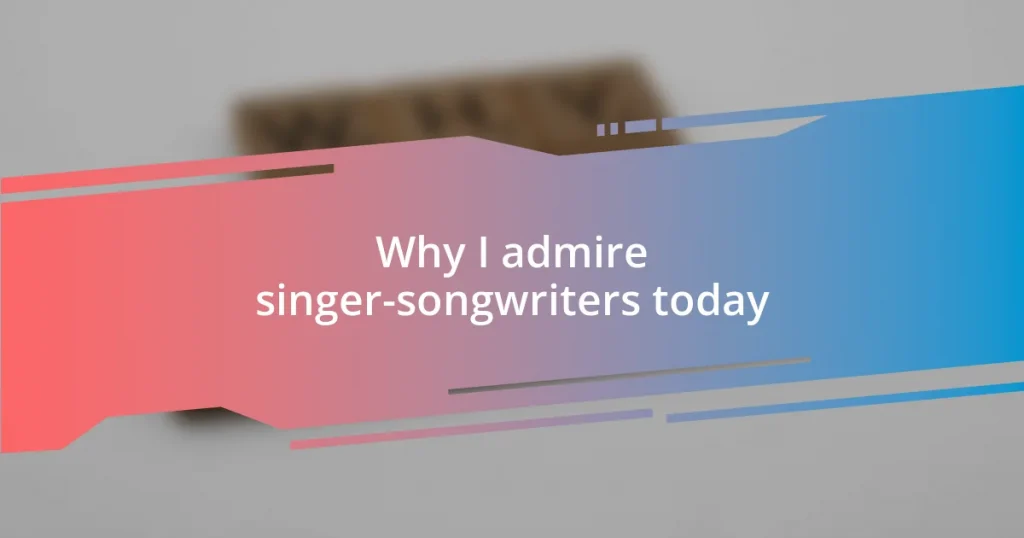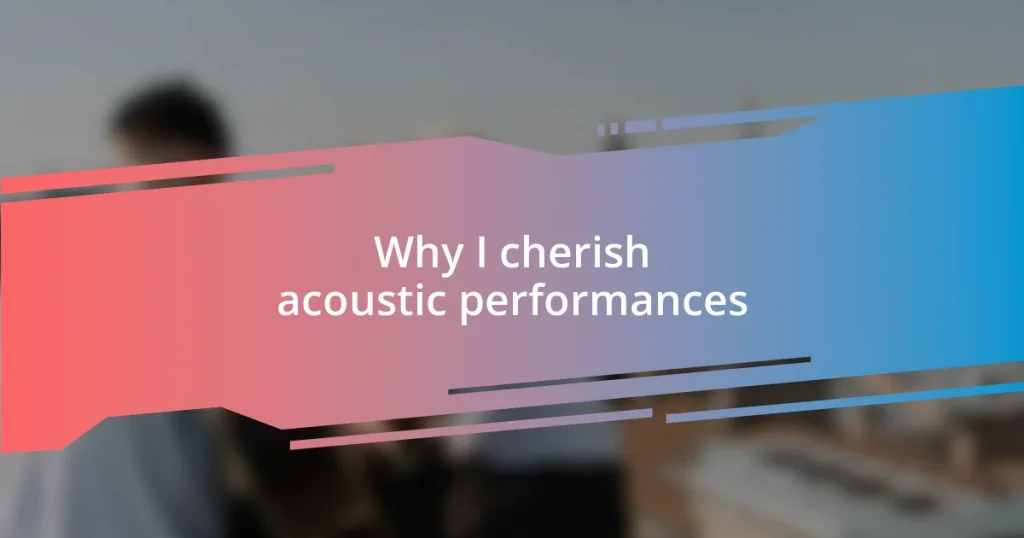Key takeaways:
- The initial inspiration and excitement for music ignited a desire to learn and create through collaboration and experimentation.
- Identifying quality resources and tools, such as online courses and music production software, streamlined the learning process significantly.
- Collaborating with other musicians offered transformative experiences that enhanced creativity and fostered growth through diverse musical influences.
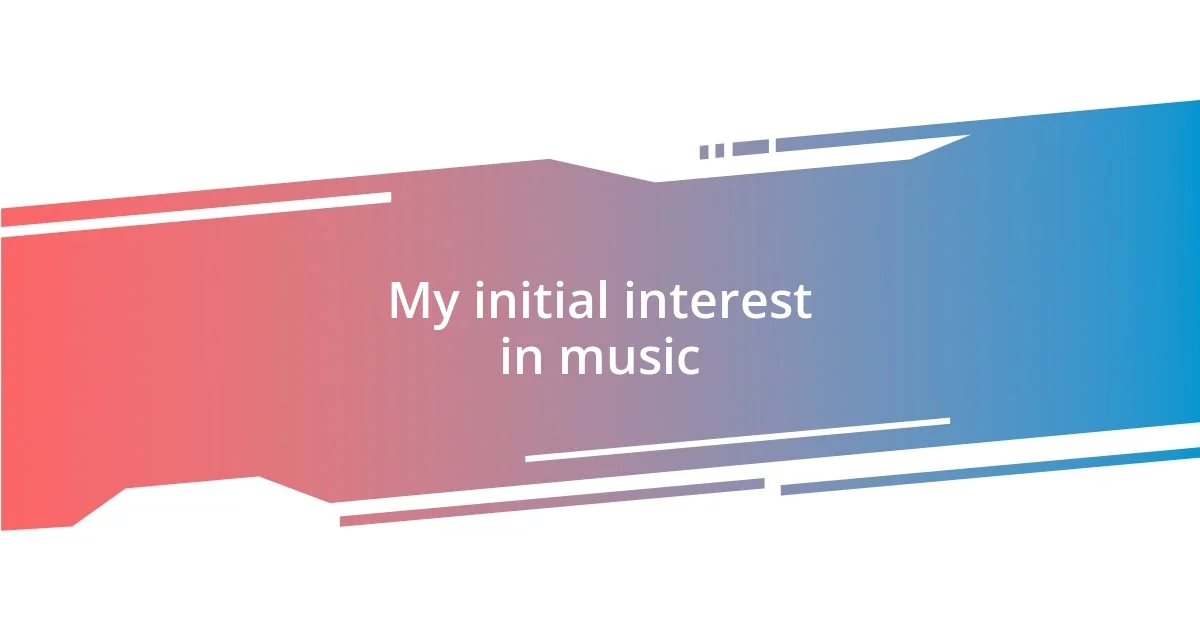
My initial interest in music
Music has always been a companion in my life, echoing in the background of my childhood memories. I remember being captivated by the way a simple melody could lift my spirits or transport me to another world. Can you relate to that feeling? The first time I heard a song that sparked a sense of joy in me, I knew I wanted to explore that magic further.
Attending a friend’s band practice was a turning point for me. Watching them create something beautiful together was mesmerizing, and I felt a rush of excitement. In that moment, I realized that music wasn’t just something to listen to; it was an art form that invited collaboration and creativity. Did I dare to imagine myself as part of that world? Absolutely.
Eventually, I took the leap and started learning an instrument. Each strum and note was a step deeper into this passion. There were frustrations along the way—misfired chords and off-beat rhythms—but also triumphs that made every challenge worth it. Have you ever started something new that filled you with both joy and trepidation? That’s exactly how I felt as I began this exhilarating journey into music.
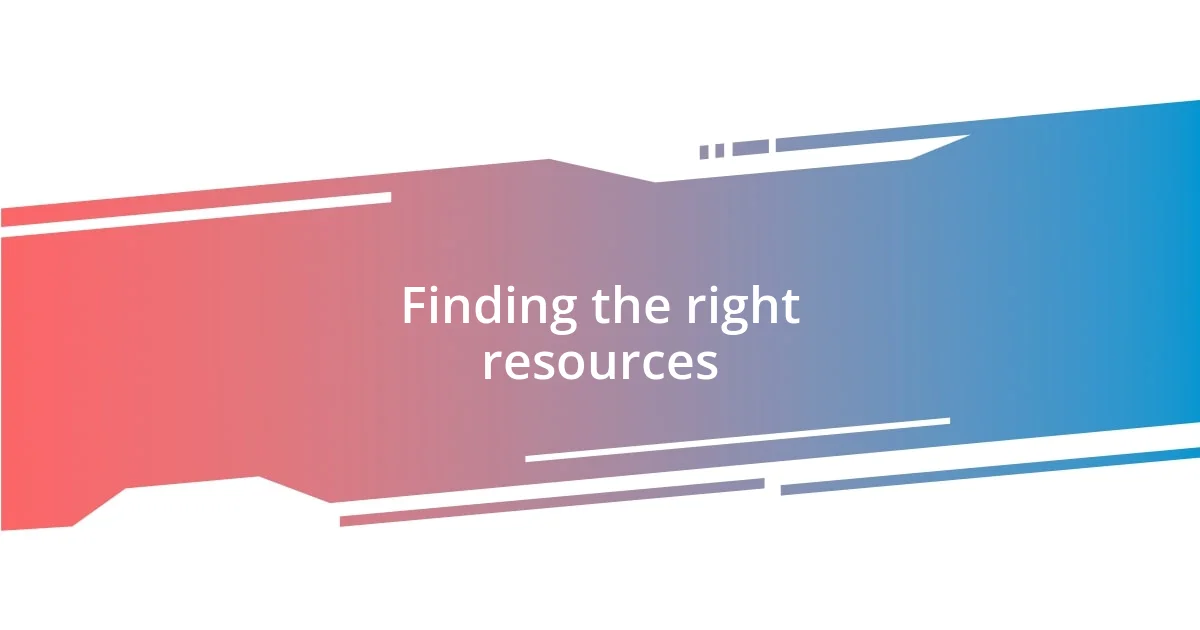
Finding the right resources
Finding the right resources was like navigating a vast ocean. At first, I felt overwhelmed by the sheer number of platforms and materials available. I had no idea which were credible and which were just noise. After sifting through countless tutorials and articles, I learned that quality truly matters. Connecting with the right people also made a significant difference. I found forums and social media groups where fellow enthusiasts shared their favorite resources, shining a light on hidden gems I wouldn’t have discovered otherwise.
To streamline this process, I focused on these key resources that helped me immensely:
- Online Courses: Platforms like Coursera and Udemy offer structured learning from established professionals.
- YouTube Channels: I came across channels like Andrew Huang and Point Blank Music School, which break down complex concepts into digestible lessons.
- Books: Reading “The Mixing Engineer’s Handbook” by Bobby Owsinski gave me insights into the technical side of production.
- Music Production Software: I started with Ableton Live; its user-friendly interface was a great entry point for a newbie.
- Community Forums: Engaging in Reddit’s music production threads opened up conversations that deepened my understanding.
Finding these resources transformed my learning experience, guiding me from confusion to clarity as I embraced music production.
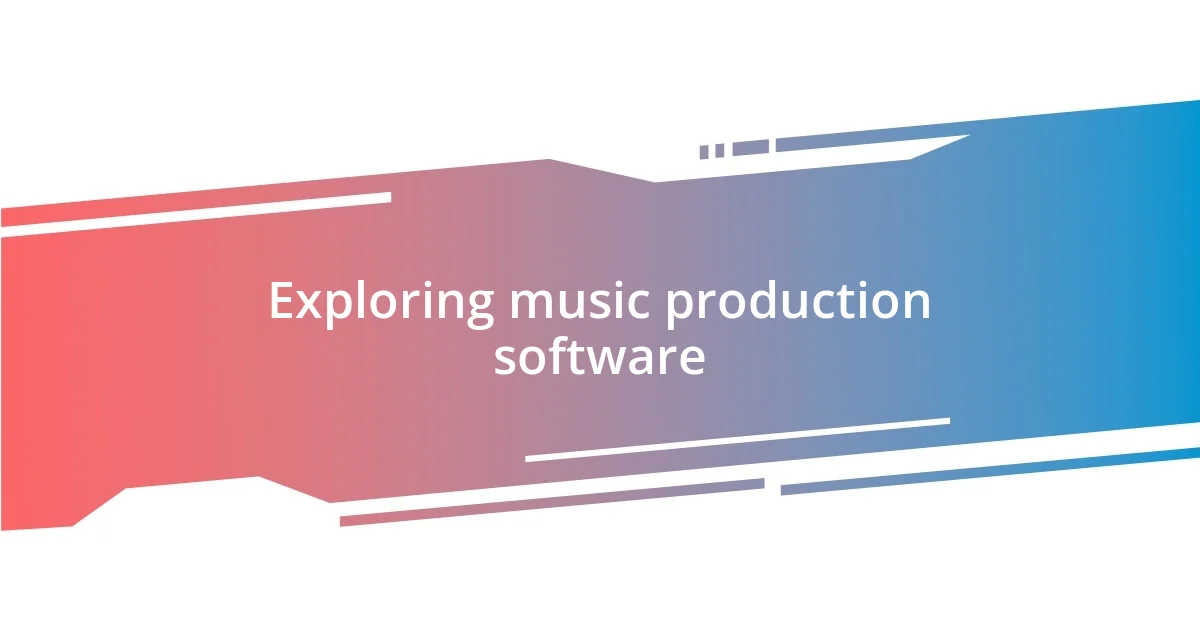
Exploring music production software
Exploring music production software was a delightful experience for me. Initially, I felt like a kid in a candy store, faced with so many options. Each software had its unique features that could either confuse or inspire. For example, my first encounter with FL Studio was magical; its vibrant interface just made me want to dive right in and start experimenting. Can you remember the excitement of using a tool that got your creativity flowing?
As I progressed, I started comparing different software to find which best suited my workflow. Logic Pro X, for instance, offered incredible sound libraries and seamless integration with Apple products, making it ideal for those already entrenched in the Apple ecosystem. On the other hand, I found that Pro Tools excelled in professional mixing and mastering, something I aspired to achieve someday. Each software taught me something new about sound design and the production process, steadily bridging the gap from novice to more experienced producer.
In my journey, I created a table to encapsulate my findings, showcasing the strengths of each software I explored. This was particularly helpful for me when I needed to choose which tool to invest more time in.
| Software | Best For |
|---|---|
| Ableton Live | Real-time music creation and live performances |
| FL Studio | Beat-making and user-friendly features |
| Logic Pro X | Comprehensive production tools with extensive libraries |
| Pro Tools | Professional mixing and mastering |
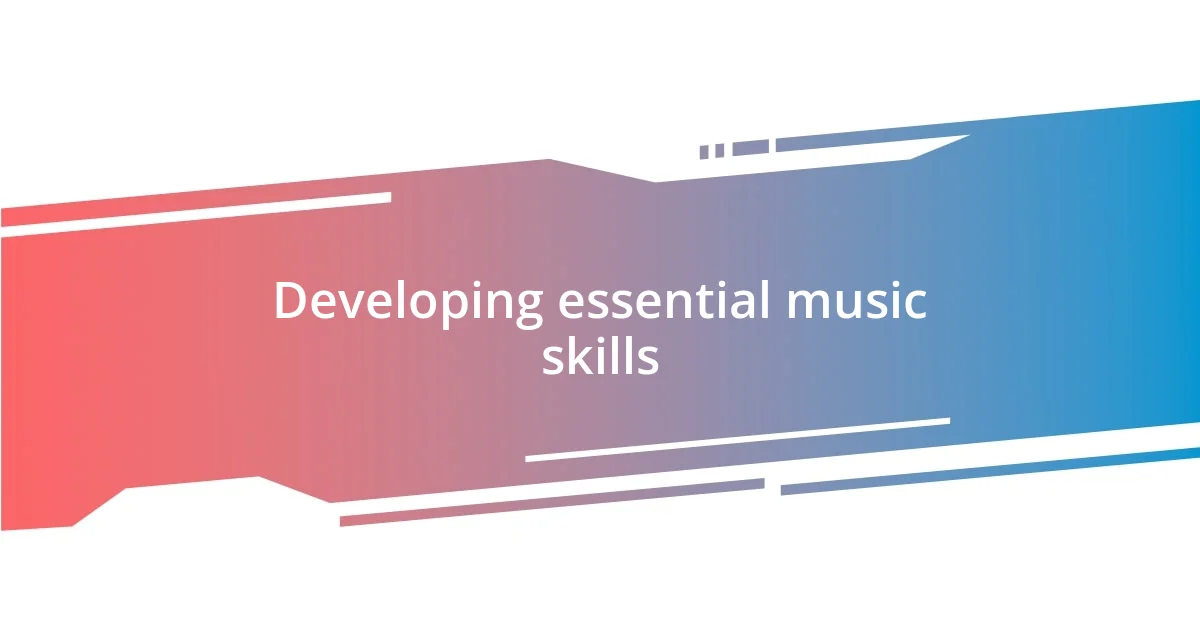
Developing essential music skills
Developing essential music skills goes beyond just understanding software; it’s about honing the craft of music itself. I vividly remember the moment I decided to dive into the basics of music theory. At first, terms like “chords” and “scales” seemed daunting. But as I began to understand how they shape a song, everything clicked. Have you ever felt that rush of clarity when a complex topic suddenly makes sense? That’s what learning music theory did for me—it opened up a new world of creativity.
Practicing my ear was another crucial step in my journey. I’d sit with my headphones on, listening to my favorite tracks and trying to identify each instrument and how they interacted. It felt like a treasure hunt for sounds! It’s fascinating how developing that ability not only improved my production but also enhanced my appreciation for music in general. I can recall one afternoon when I could precisely pinpoint a synth line in a piece I loved, and the joy that followed was indescribable.
Then there’s the skill of arranging. I learned that structure is key to making a song come alive. Experimenting with different arrangements taught me what worked and what didn’t. I remember drafting a piece that felt flat until I shifted the chorus to the beginning—suddenly, everything changed. Those ‘aha’ moments in arranging have been some of the most rewarding experiences in my journey, proving that sometimes, a simple adjustment can elevate your work to new heights. How has your own experimentation shaped your understanding of music?
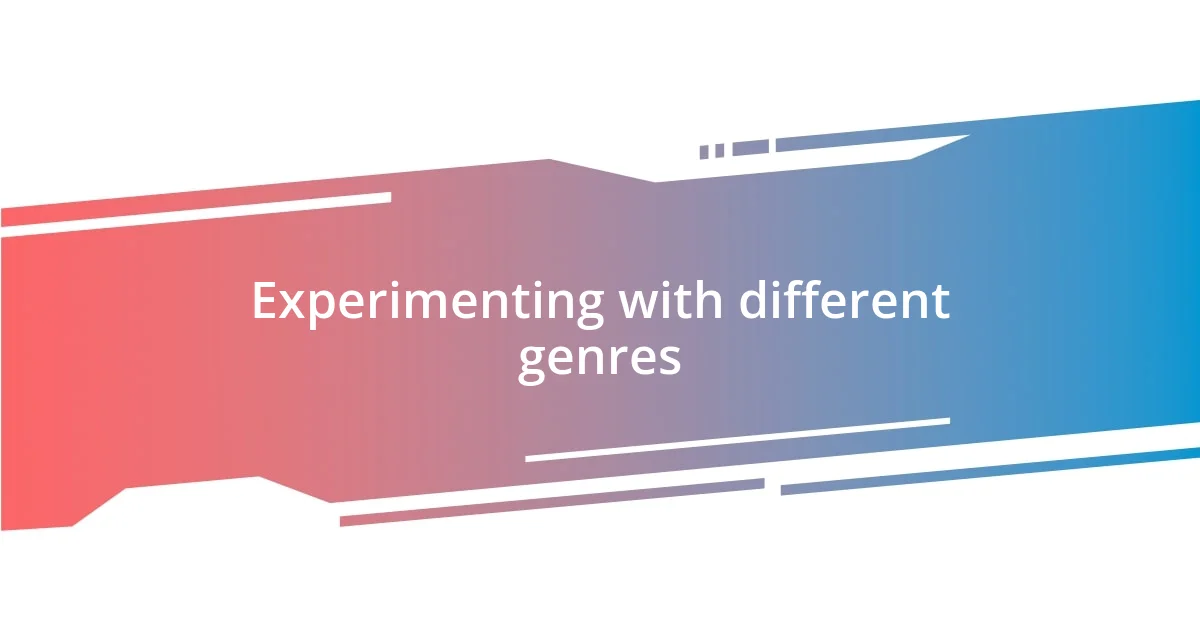
Experimenting with different genres
Experimenting with different genres has been a thrilling aspect of my music production journey. One day, I decided to try my hand at creating a trap beat. Initially, I felt out of my comfort zone, but the challenge ignited a spark within me. I remember how proud I felt when I nailed that signature hi-hat roll—those rapid-fire notes that give trap its distinctive groove. Have you ever stumbled upon a genre that seemed foreign, yet invigorated your creativity?
As I ventured deeper, I found myself lost in the serene world of lo-fi hip hop. The challenge here was to balance the chill vibe with engaging melodies. I soaked in the process, layering soft piano chords with vinyl crackles to give my tracks that nostalgic feel. Those moments were intimate; I often found myself sipping coffee late at night, fully immersed in soundscapes that felt like a warm embrace. Isn’t it fascinating how music can cultivate such strong emotions?
Trying out genres like EDM and jazz opened my eyes to different production techniques too. I remember collaborating with a friend who was passionate about jazz fusion; the experience was enlightening. His improvisational style clashed beautifully with my structured approach, resulting in a hybrid that exceeded both our expectations. In moments like these, I learned that blending influences not only refines your skills but also shapes your unique musical identity. How have your genre explorations enriched your own creative palette?
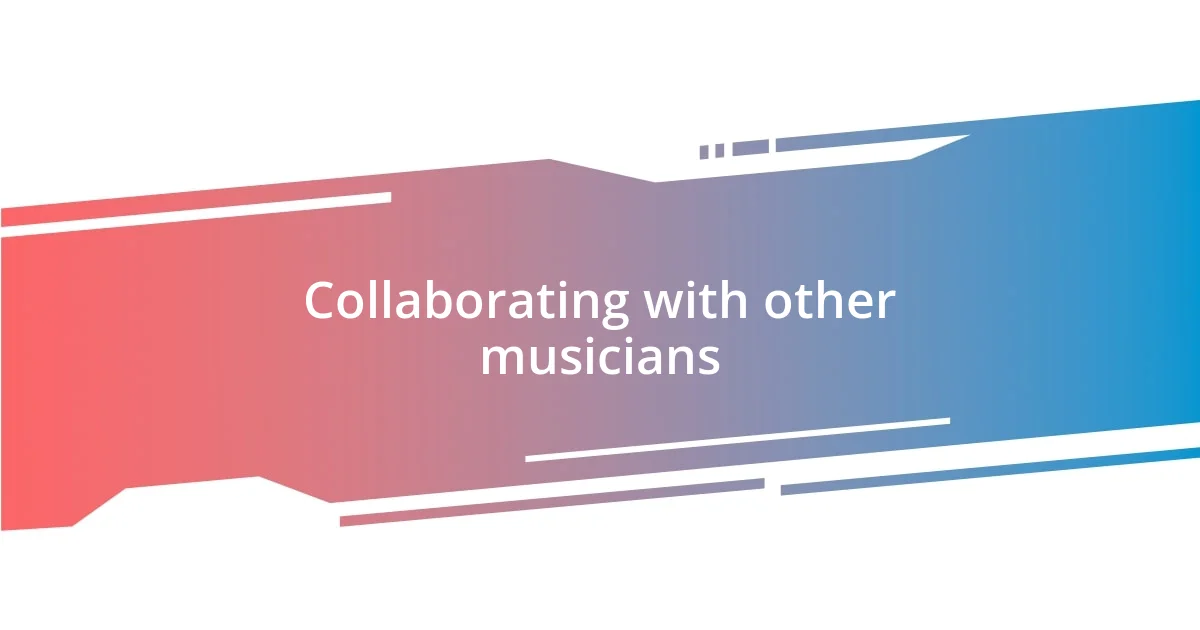
Collaborating with other musicians
Collaborating with other musicians has been one of the most transformative experiences in my music production journey. I recall the first time I teamed up with a guitarist at a local jam session. It was exhilarating to weave my electronic beats with his raw melodies. Can you imagine the synergy of different musical backgrounds merging in real-time? That collaboration sparked countless ideas for a project that neither of us could have achieved alone.
Throughout my journey, each collaboration came with its own learning curve. I remember working with a vocalist who had a completely different creative process. Her ability to improvise on the spot left me in awe. It challenged me to be more flexible and open to experimentation in my productions. Have you ever been in a situation where the unexpected pushed you to elevate your craft? Those moments made me realize that collaboration thrives on trust and the willingness to explore each other’s strengths.
Then there was the time I connected with a producer online through a music forum. Our virtual exchange was enlightening; we shared raw ideas and experimented via file-sharing. It was a unique blend of personal and digital interaction that fueled my desire to connect musically and emotionally. I remember the thrill when we completed our first track together—it felt like a fusion of our creative spirits. That experience taught me that collaboration can transcend geography, showing how technology amplifies musical relationships. How has your experience with collaboration reshaped your perception of music production?
